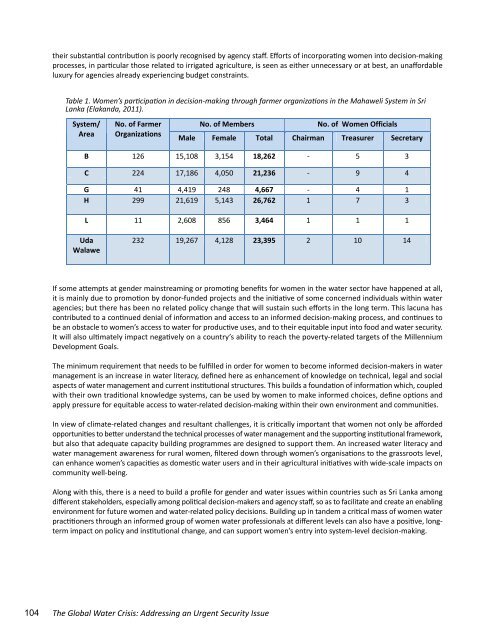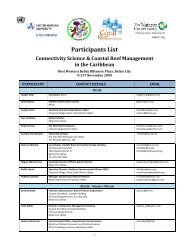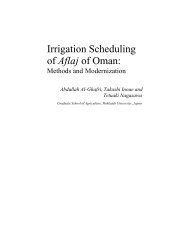The Global Water Crisis: Addressing an Urgent Security - Unu-inweh ...
The Global Water Crisis: Addressing an Urgent Security - Unu-inweh ...
The Global Water Crisis: Addressing an Urgent Security - Unu-inweh ...
Create successful ePaper yourself
Turn your PDF publications into a flip-book with our unique Google optimized e-Paper software.
their subst<strong>an</strong>tial contribution is poorly recognised by agency staff. Efforts of incorporating women into decision-making<br />
processes, in particular those related to irrigated agriculture, is seen as either unnecessary or at best, <strong>an</strong> unaffordable<br />
luxury for agencies already experiencing budget constraints.<br />
Table 1. Women’s participation in decision-making through farmer org<strong>an</strong>izations in the Mahaweli System in Sri<br />
L<strong>an</strong>ka (Elak<strong>an</strong>da, 2011).<br />
System/<br />
Area<br />
No. of Farmer<br />
Org<strong>an</strong>izations<br />
If some attempts at gender mainstreaming or promoting benefits for women in the water sector have happened at all,<br />
it is mainly due to promotion by donor-funded projects <strong>an</strong>d the initiative of some concerned individuals within water<br />
agencies; but there has been no related policy ch<strong>an</strong>ge that will sustain such efforts in the long term. This lacuna has<br />
contributed to a continued denial of information <strong>an</strong>d access to <strong>an</strong> informed decision-making process, <strong>an</strong>d continues to<br />
be <strong>an</strong> obstacle to women’s access to water for productive uses, <strong>an</strong>d to their equitable input into food <strong>an</strong>d water security.<br />
It will also ultimately impact negatively on a country’s ability to reach the poverty-related targets of the Millennium<br />
Development Goals.<br />
<strong>The</strong> minimum requirement that needs to be fulfilled in order for women to become informed decision-makers in water<br />
m<strong>an</strong>agement is <strong>an</strong> increase in water literacy, defined here as enh<strong>an</strong>cement of knowledge on technical, legal <strong>an</strong>d social<br />
aspects of water m<strong>an</strong>agement <strong>an</strong>d current institutional structures. This builds a foundation of information which, coupled<br />
with their own traditional knowledge systems, c<strong>an</strong> be used by women to make informed choices, define options <strong>an</strong>d<br />
apply pressure for equitable access to water-related decision-making within their own environment <strong>an</strong>d communities.<br />
In view of climate-related ch<strong>an</strong>ges <strong>an</strong>d result<strong>an</strong>t challenges, it is critically import<strong>an</strong>t that women not only be afforded<br />
opportunities to better underst<strong>an</strong>d the technical processes of water m<strong>an</strong>agement <strong>an</strong>d the supporting institutional framework,<br />
but also that adequate capacity building programmes are designed to support them. An increased water literacy <strong>an</strong>d<br />
water m<strong>an</strong>agement awareness for rural women, filtered down through women’s org<strong>an</strong>isations to the grassroots level,<br />
c<strong>an</strong> enh<strong>an</strong>ce women’s capacities as domestic water users <strong>an</strong>d in their agricultural initiatives with wide-scale impacts on<br />
community well-being.<br />
Along with this, there is a need to build a profile for gender <strong>an</strong>d water issues within countries such as Sri L<strong>an</strong>ka among<br />
different stakeholders, especially among political decision-makers <strong>an</strong>d agency staff, so as to facilitate <strong>an</strong>d create <strong>an</strong> enabling<br />
environment for future women <strong>an</strong>d water-related policy decisions. Building up in t<strong>an</strong>dem a critical mass of women water<br />
practitioners through <strong>an</strong> informed group of women water professionals at different levels c<strong>an</strong> also have a positive, longterm<br />
impact on policy <strong>an</strong>d institutional ch<strong>an</strong>ge, <strong>an</strong>d c<strong>an</strong> support women’s entry into system-level decision-making.<br />
104 <strong>The</strong> <strong>Global</strong> <strong>Water</strong> <strong>Crisis</strong>: <strong>Addressing</strong> <strong>an</strong> <strong>Urgent</strong> <strong>Security</strong> Issue<br />
No. of Members No. of Women Officials<br />
Male Female Total Chairm<strong>an</strong> Treasurer Secretary<br />
B 126 15,108 3,154 18,262 - 5 3<br />
C 224 17,186 4,050 21,236 - 9 4<br />
G 41 4,419 248 4,667 - 4 1<br />
H 299 21,619 5,143 26,762 1 7 3<br />
L 11 2,608 856 3,464 1 1 1<br />
Uda<br />
Walawe<br />
232 19,267 4,128 23,395 2 10 14




